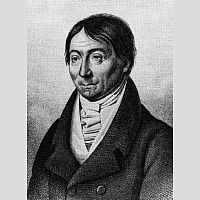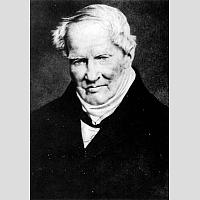Carl Ludwig Willdenow
- Bio
- * 1765, Berlin, Germany
- † 1812, Berlin, Germany
- Career
- after working in his father's pharmacy, in 1785 enrolement at University of Halle to study medicine; 1787 attendence at Wiegleb's apothecary school in Langensalza, publication of his Prodomus florae Berolinensis, a standard account of plants in the Berlin region; doctoral degree in Halle in 1789, followed by medical practice and private botanical lectures in Berlin; teacher of Alexander von Humboldt; 1792 Grundriß der Kräuterkunde; 1794 member of the Prussian Academy of Science; 1796 Berlinische wilde Baumzucht , containing 497 species cultivated in Berlin (2nd ed. 1811, 770 species); 1798 professor of natural history at the Collegio medico chirurgico, 1801 botanist of the Academy of Science, public teacher of botany at forest departement and Pépiniére in Berlin, and director of the Royal Botanical Garden in Schöneberg; 1804 Anleitung zum Selbststudium der Botanik; 1810 professor of botany at the Friedrich-Wilhelm-University, Berlin; 1811 journey to Paris to work on A. v. Humboldt's South American plant collections; editor of Linneaus's Species plantarum (1797-1810); starting in 1806 editor of the catalogues of the Royal Botanical Garden Hortus Berolinensis, which were continued by his successor Heinrich Friedrich Link.
- Degrees
- Dr. med. (1789)
Related VLP records

Heinrich Friedrich Link
1767 - 1851
Willdenow, Carl Ludwig.
1821.
Grundriss der Kräuterkunde: Zu Vorlesungen entworfen.
6th ed. Berlin: Haude.
Book
VL People
- Permalink (old)
- http://vlp.uni-regensburg.de/references?id=per602
![[Portrait of Carl Ludwig Willdenow]](/images/img29785/thumb250)
